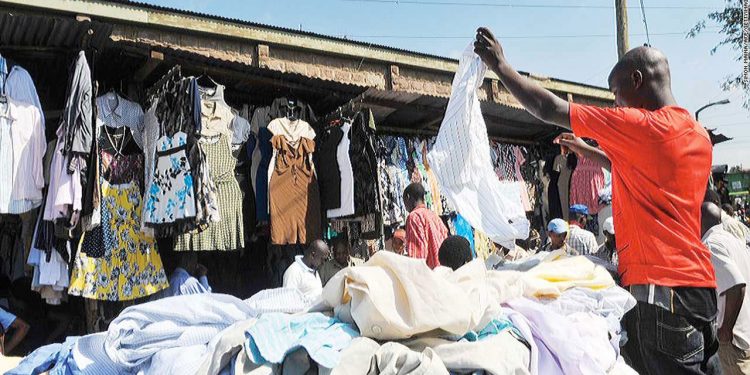HARARE, Zimbabwe
Like many economically pummeled families in Zimbabwe, 41-year-old Melinda Gambiza, her husband, and their four school-going children have long since stopped getting new clothes.
Despite Melinda, a teacher, and her husband who works as a bus driver both being wage earners, even their combined monthly income of $210 has done little to surmount the growing suffering of the family, who have resorted to using second-hand clothes to cut costs.
Apart from tending to their own needs with their meagre resources, the couple are also battling to keep two of their children in boarding school.
To make ends meet, they have thus had to switch to second-hand apparel amid the rising prices of clothes at large department stores in the southern African country.
“Even for our children’s school uniforms, I now look to second-hand clothes dealers who also sell second-hand school uniforms, and this saves a bit of money for us because, surely, we can’t afford going into shops with the little money we have,” Melinda told Anadolu Agency.
The situation is even worse for many unemployed Zimbabweans, like 27-year-old Neville Musasa, who lives in the capital Harare’s densely populated suburb of Mufakose.
“I have no income, and if a kind relative gives me a bit of money to spend, I go straight to the second-hand clothes market in Mbare, where, with just about $5, I can buy more than five pieces of clothing because the clothes there are very cheap,” Musasa, who used to work as a rank marshal at a bus terminal in Harare, told Anadolu Agency.
Coronavirus fuels demand for second-hand clothes
Many like Musasa lost their jobs when authorities banned public transport from operating in a bid to curb the spread of the coronavirus.
On a broader scale, more than 90% of Zimbabweans are unemployed, according to the Zimbabwe Congress of Trade Unions (ZCTU).
Under these circumstance, second-hand clothes enjoy booming demand in the southern African nation as desperate people like Musasa and the Gambiza family have to ditch the expensive wear in major shops that have become a pipe dream for the millions of ordinary Zimbabweans lacking formal employment.
Cashing in
This has also opened floodgates for opportunity among hordes of entrepreneurial residents of the country, like 47-year-old Agness Siziba, who has for years run a market stall for second-hand clothes in downtown Harare.
“I order second-hand clothes from Mozambique, and they sell so fast here because people find them cheap and affordable compared to the formal shops,” Siziba told Anadolu Agency, adding that she had people selling her wares at several points in the city.
On a good day, she said she takes home about $350 in sales.
Business is thriving for Siziba, even as authorities have sought to prevent the second-hand clothes trade.
Last May, the police spokesperson in the southeastern Masvingo province, Charity Mazula, went on record in local media urging residents to heed the impact of the coronavirus and stop smuggling second-hand clothes that could potentially spread the virus.
Yet, this has not moved impoverished Zimbabweans.
Zimbabwe first banned imports of second-hand clothes in 2015 in a bid to protect the country’s textile industry, although it relaxed the restrictions two years later.
Option for the poor
Now, as the economy teeters, second-hand clothes have been a godsend for many like the Gambiza family and have turned the fortunes of many others like Siziba.
Even as the country shut its borders on March 30 to all traffic except approved cargoes as an anti-pandemic measure, second-hand clothes have continued to find their way through via illegal entry points, indicating that business remains brisk for many dealers.
Formal clothing shops, on the other hand, have begun to feel the heat as their second-hand counterparts continue to steal the show in the midst of Zimbabwe’s comatose economy.
In 2019, faced with growing operational challenges, the struggling South African retail giant Edcon was given the green light to sell its shares in the Zimbabwe-based clothing chain Edgars to SSCG Africa Holdings, a Mauritius-incorporated entity.
Needless to say, informal second-hand clothes dealers like Siziba have wasted no time filling the gap.






